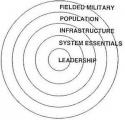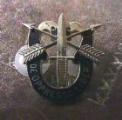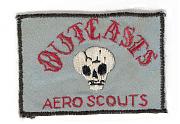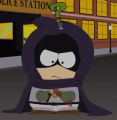New ideas from 1961
http://www.jfklink.com/speeches/jfk/...jfk205_61.html
Nation building
Expanding the NetworkWe would be badly mistaken to consider their problems in military terms alone. For no amount of arms and armies can help stabilize those governments which are unable or unwilling to achieve social and economic reform and development. Military pacts cannot help nations whose social injustice and economic chaos invite insurgency and penetration and subversion. The most skillful counter-guerrilla efforts cannot succeed where the local population is too caught up in its own misery to be concerned about the advance of communism.
But for those who share this view, we stand ready now, as we have in the past, to provide generously of our skills, and our capital, and our food to assist the peoples of the less-developed nations to reach their goals in freedom - to help them before they are engulfed in crisis.
This is also our great opportunity in 1961. If we grasp it, then subversion to prevent its success is exposed as an unjustifiable attempt to keep these nations from either being free or equal. But if we do not pursue it, and if they do not pursue it, the bankruptcy of unstable governments, one by one, and of unfilled hopes will surely lead to a series of totalitarian receiverships.
Security Force AssistanceThe center of freedom's defense is our network of world alliances, extending from NATO, recommended by a Democratic President and approved by a Republican Congress, to SEATO, recommended by a Republican President and approved by a Democratic Congress. These alliances were constructed in the 1940's and 1950's - it is our task and responsibility in the 1960's to strengthen them.
Nice prose, sounds great, but we saw all this in practice during the Vietnam War and since. Much more at the site.The main burden of local defense against local attack, subversion, insurrection or guerrilla warfare must of necessity rest with local forces. Where these forces have the necessary will and capacity to cope with such threats, our intervention is rarely necessary or helpful. Where the will is present and only capacity is lacking, our Military Assistance Program can be of help.
But this program, like economic assistance, needs a new emphasis. It cannot be extended without regard to the social, political and military reforms essential to internal respect and stability. The equipment and training provided must be tailored to legitimate local needs and to our own foreign and military policies, not to our supply of military stocks or a local leader's desire for military display. And military assistance can, in addition to its military purposes, make a contribution to economic progress, as do our own Army Engineers.
Modernization
In line with these developments, I have directed a further reinforcement of our own capacity to deter or resist non-nuclear aggression. In the conventional field, with one exception, I find no present need for large new levies of men. What is needed is rather a change of position to give us still further increases in flexibility.
Therefore, I am directing the Secretary of Defense to undertake a reorganization and modernization of the Army's divisional structure, to increase its non-nuclear firepower, to improve its tactical mobility in any environment, to insure its flexibility to meet any direct or indirect threat, to facilitate its coordination with our major allies, and to provide more modern mechanized divisions in Europe and bring their equipment up to date, and new airborne brigades in both the Pacific and Europe.And secondly, I am asking the Congress for an additional 100 million dollars to begin the procurement task necessary to re-equip this new Army structure with the most modern material. New helicopters, new armored personnel carriers, and new howitzers, for example, must be obtained now.
Third, I am directing the Secretary of Defense to expand rapidly and substantially, in cooperation with our Allies, the orientation of existing forces for the conduct of non-nuclear war, para-military operations and sub-limited or unconventional wars.In addition, our special forces and unconventional warfare units will be increased and reoriented. Throughout the services new emphasis must be placed on the special skills and languages which are required to work with local populations.Fourth, the Army is developing plans to make possible a much more rapid deployment of a major portion of its highly trained reserve forces. When these plans are completed and the reserve is strengthened, two combat-equipped divisions, plus their supporting forces, a total of 89,000 men, could be ready in an emergency for operations with but 3 weeks' notice - 2 more divisions with but 5 weeks' notice - and six additional divisions and their supporting forces, making a total of 10 divisions, could be deployable with less than 8 weeks' notice. In short, these new plans will allow us to almost double the combat power of the Army in less than two months, compared to the nearly nine months heretofore required.History may not repeat itself, but it does rhyme.Finally, to cite one other area of activities that are both legitimate and necessary as a means of self-defense in an age of hidden perils, our whole intelligence effort must be reviewed, and its coordination with other elements of policy assured. The Congress and the American people are entitled to know that we will institute whatever new organization, policies, and control are necessary.








 . The good news is that his lack of combat experience helps explain his naivism to some extent. The bad news is my memory is failing me. I could of swore I saw commercials during the election of him manning a AAA weapon and firing at Japanese Zeros. That begs the question how many Presidents have actual combat experience? I'm thinking at a minimum you have George Washington, Teddy Roosevelt, Ike commanded in combat, not sure he saw any, JFK, and Bush Sr.
. The good news is that his lack of combat experience helps explain his naivism to some extent. The bad news is my memory is failing me. I could of swore I saw commercials during the election of him manning a AAA weapon and firing at Japanese Zeros. That begs the question how many Presidents have actual combat experience? I'm thinking at a minimum you have George Washington, Teddy Roosevelt, Ike commanded in combat, not sure he saw any, JFK, and Bush Sr. 



Bookmarks